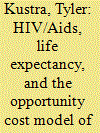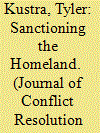| Srl | Item |
| 1 |
ID:
156537


|
|
|
|
|
| Summary/Abstract |
This article views death in battle as an opportunity cost whose size is determined by the number of years a rebel would have lived as a civilian. As civilian life expectancy declines, this opportunity cost does too, increasing the probability of rebellion. This theory is tested with a tragic natural experiment: the HIV/AIDS epidemic in sub-Saharan Africa. Using male circumcision rates as an instrument for life expectancy, the analysis shows that a one-year increase in life expectancy decreases the probability of civil war by 2.6 percentage points. This supports the theory that opportunity costs are important determinants of conflict onset and that nonpecuniary opportunity costs should be taken into account. This article concludes by noting that cost–benefit analyses of public health interventions should include decreases in the probability of civil war, and the attendant benefits in terms of lives saved and material damage prevented, in their calculations.
|
|
|
|
|
|
|
|
|
|
|
|
|
|
|
|
| 2 |
ID:
170011


|
|
|
|
|
| Summary/Abstract |
This article calls into question the theory that being single drives young men to commit political violence. It finds that, while the proportion of young men in a country has a statistically significant impact on the level of political violence in the country, whether or not these men are married has no additional impact. The result may appear to contradict the individual-level evidence that shows that young, unmarried men commit the overwhelming majority of political violence. Rebels and terrorists, however, make up only a small part of a country's population. If participating in political violence caused young men to be single, this would have a negligible impact on a country's proportion of single young men, thereby explaining why marital status is uncorrelated with political violence at the national level. It would also explain why the individual-level evidence shows that most terrorists and guerillas are single.
|
|
|
|
|
|
|
|
|
|
|
|
|
|
|
|
| 3 |
ID:
185673


|
|
|
|
|
| Summary/Abstract |
Why do some immigrant groups succeed in influencing the U.S. government to impose economic sanctions on their former dictators, while others do not? This paper begins by noting that the president is the pivotal player in sanctions policy and that presidents cater to voters in swing states. Therefore, a diaspora’s proportion of the swing-state electorate should determine whether the American government imposes sanctions on their former homeland. Considering dictatorships from 1946 to 2005, this paper finds that a one-percentage-point increase in the diaspora’s proportion of the swing-state electorate increases the probability of regime-change sanctions by 11 percentage points. It then calculates causal estimates of the effectiveness of these sanctions on regime change. Using the diaspora’s proportion of the swing-state electorate as an instrumental variable for the presence of economic sanctions, it finds that sanctions do not have a positive, statistically-significant impact on regime change while a negative impact is plausible.
|
|
|
|
|
|
|
|
|
|
|
|
|
|
|
|